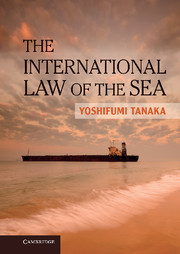Book contents
- Frontmatter
- Contents
- Preface
- Acknowledgements
- Figures
- Tables
- Abbreviations
- Table of Cases
- Table of Treaties and Instruments
- Part I The Divided Oceans: International Law Governing Jurisdictional Zones
- Part II Our Common Ocean: Protection of Community Interests at Sea
- 7 Conservation of Marine Living Resources
- 8 Protection of the Marine Environment
- 9 Conservation of Marine Biological Diversity
- 10 Marine Scientific Research
- 11 Maintenance of International Peace and Security at Sea
- 12 Land-Locked and Geographically Disadvantaged States
- 13 Peaceful Settlement of International Disputes
- Index
- References
11 - Maintenance of International Peace and Security at Sea
Main Issues
from Part II - Our Common Ocean: Protection of Community Interests at Sea
- Frontmatter
- Contents
- Preface
- Acknowledgements
- Figures
- Tables
- Abbreviations
- Table of Cases
- Table of Treaties and Instruments
- Part I The Divided Oceans: International Law Governing Jurisdictional Zones
- Part II Our Common Ocean: Protection of Community Interests at Sea
- 7 Conservation of Marine Living Resources
- 8 Protection of the Marine Environment
- 9 Conservation of Marine Biological Diversity
- 10 Marine Scientific Research
- 11 Maintenance of International Peace and Security at Sea
- 12 Land-Locked and Geographically Disadvantaged States
- 13 Peaceful Settlement of International Disputes
- Index
- References
Summary
International peace and security on the oceans are currently faced with a variety of threats. For instance, piracy and armed robbery against ships are serious problems endangering the welfare of seafarers and the security of sea communication. The proliferation of weapons of mass destruction through marine transport is a matter of pressing concern. Furthermore, military uses of the oceans raise international tension between interests of the coastal State and interests of the naval State. Thus this chapter will address the maintenance of international peace and security at sea. Principal focus will be on the following issues:
What are the rules applicable to the suppression of piracy and its limitations?
What are the rules applicable to the prevention and suppression of maritime terrorism and other unlawful offences at sea?
Are military exercises in the EEZ of a foreign State permissible in the law of the sea?
What is the significance of nuclear weapon-free zones in the maintenance of international peace and security at sea?
Introduction
The maintenance of international peace and security is a fundamental issue underlying international law and the international law of the sea is no exception. In this regard, Article 301 of the LOSC provides a clear obligation with regard to peaceful uses of the sea:
In exercising their rights and performing their duties under this Convention, States Parties shall refrain from any threat or use of force against the territorial integrity or political independence of any State, or in any other manner inconsistent with the principles of international law embodied in the Charter of the United Nations.
Further to this, several provisions of the LOSC reserve the use of the oceans for peaceful purposes.
- Type
- Chapter
- Information
- The International Law of the Sea , pp. 353 - 375Publisher: Cambridge University PressPrint publication year: 2012



